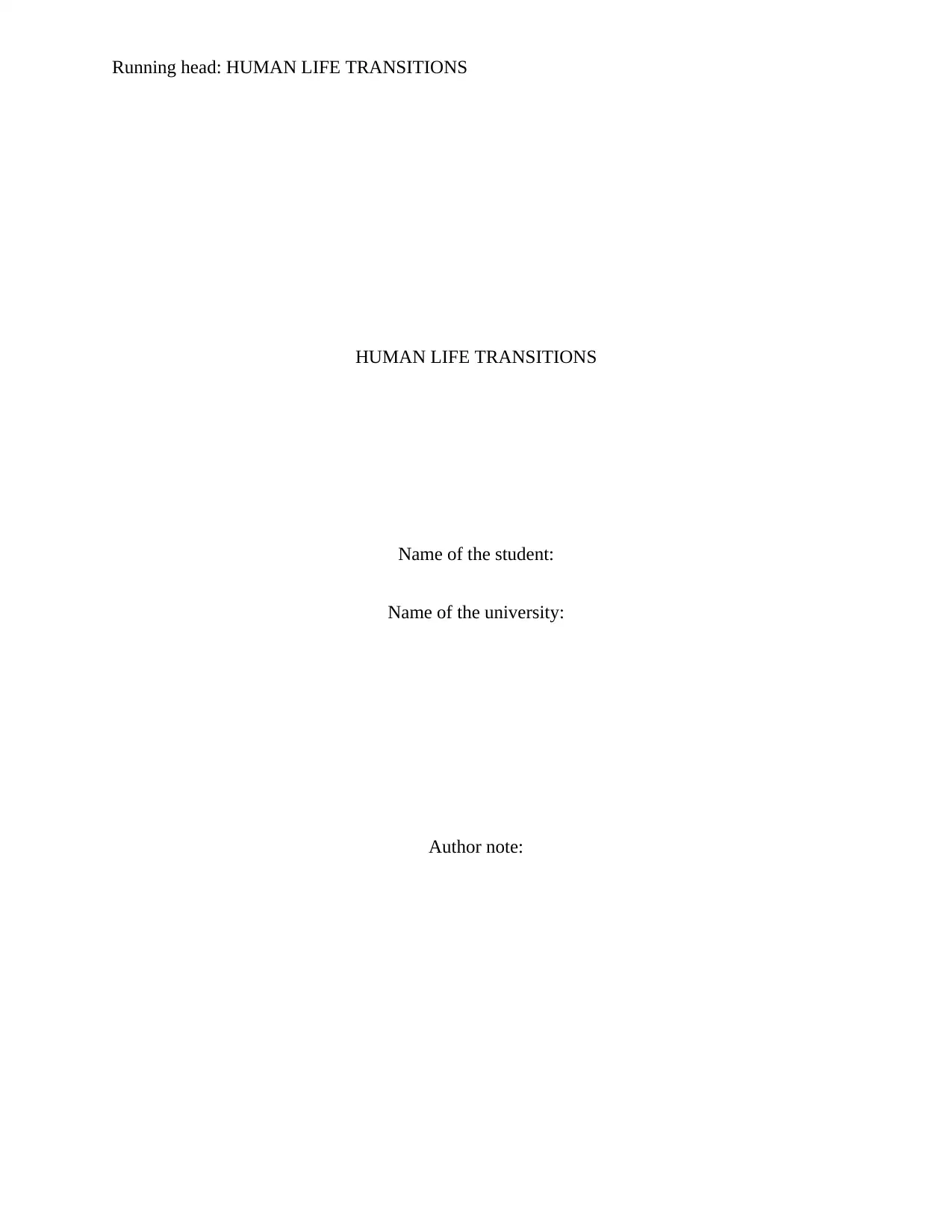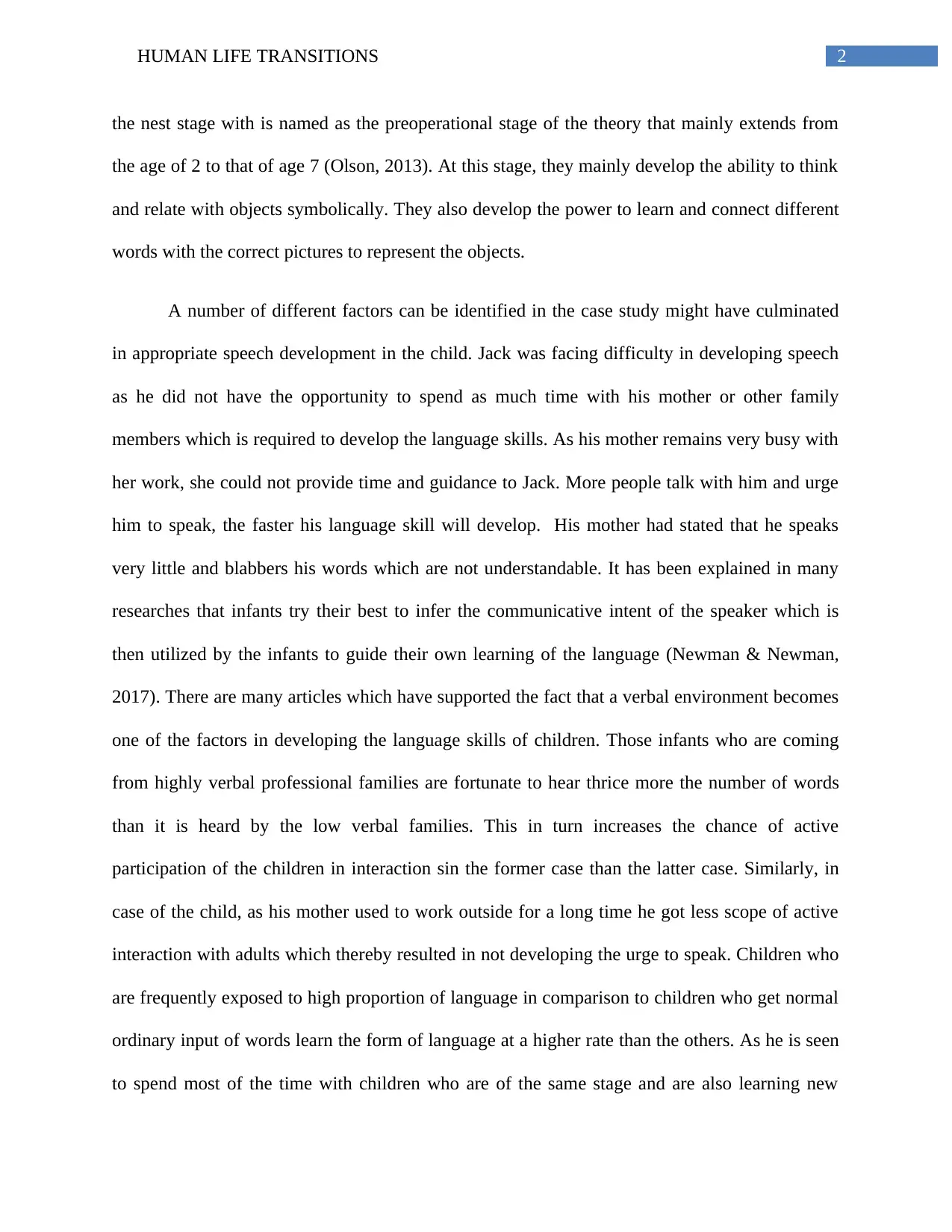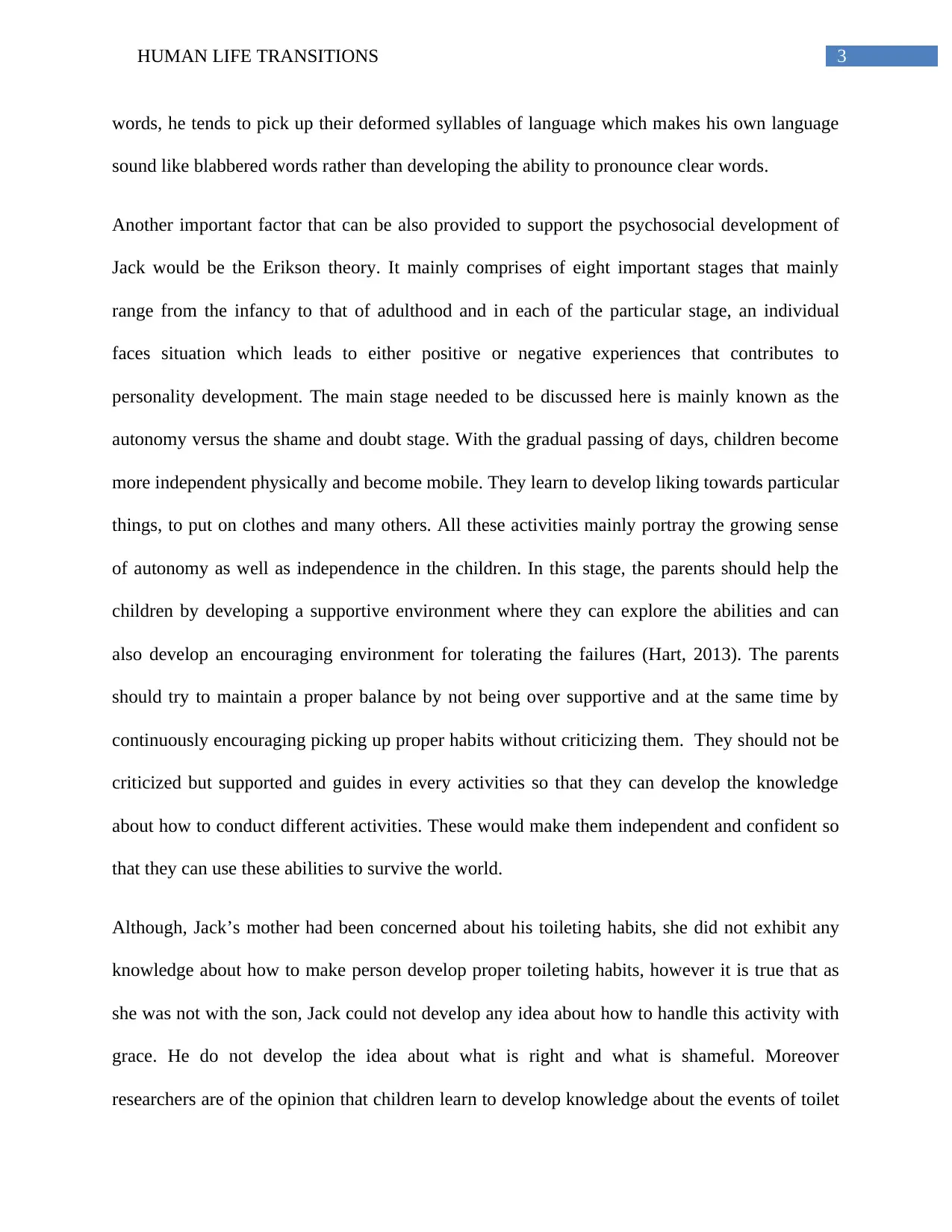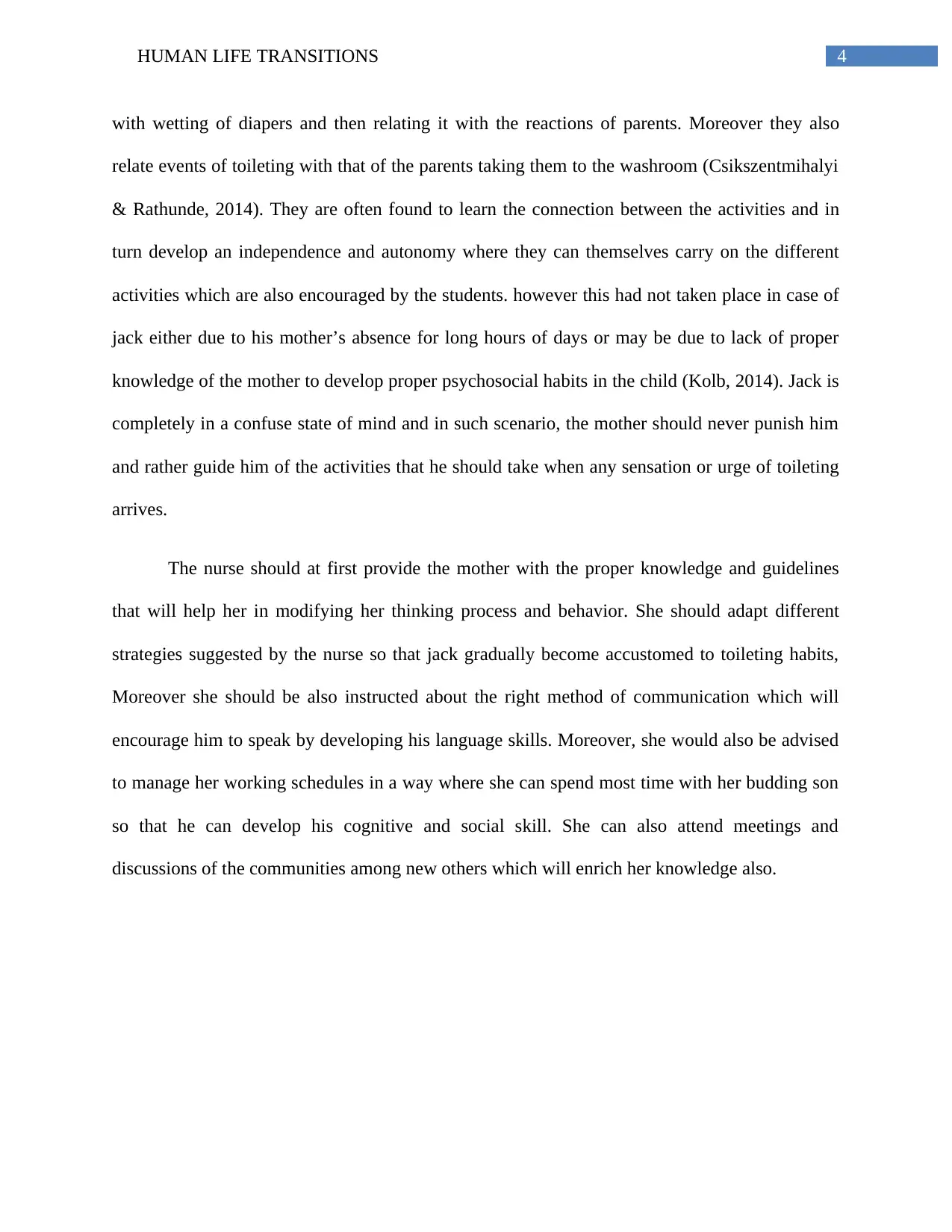Exploring Human Life Transitions through Piaget and Erikson's Theories
VerifiedAdded on 2020/04/07
|7
|1695
|57
Essay
AI Summary
The essay explores human development through the lenses of Piaget’s cognitive development theory and Erikson’s psychosocial stages, highlighting their impact on understanding life transitions. Piaget’s work outlines how children construct knowledge through interaction with their environment, progressing through distinct stages: sensorimotor, preoperational, concrete operational, and formal operational. In contrast, Erikson presents eight psychosocial stages that emphasize the social nature of human growth and development across a lifespan, from trust versus mistrust in infancy to integrity versus despair in old age. By integrating these theories, this paper examines how individuals navigate cognitive and psychosocial challenges, ultimately shaping their identities and interactions with the world.

Running head: HUMAN LIFE TRANSITIONS
HUMAN LIFE TRANSITIONS
Name of the student:
Name of the university:
Author note:
HUMAN LIFE TRANSITIONS
Name of the student:
Name of the university:
Author note:
Paraphrase This Document
Need a fresh take? Get an instant paraphrase of this document with our AI Paraphraser

1HUMAN LIFE TRANSITIONS
The theory of Jean Piaget is mainly based on the cognitive development of individuals as
children. This theory states how every individual develop natural intelligence as children and gin
knowledge sequentially as days pass (Carey & Gelman, 2014). He also stated that children take
initiatives in becoming a part in the learning of new information about the world, develop
interactions with their surrounding, gather information about the new learning, enhancing their
exiting knowledge and thereby develop the capability to properly link with the previously held
ideas so that new information can be gathered for better knowing of human activities (Mischel,
2013).
There are four important stages that are mentioned by Piaget in his theory which
describes the rationale behind the cognitive development of the children in each case of their
growing up. However, the main stage that needs to be discussed in relation to the case study is
sensorimotor stage. This stage mainly refers to the growing phase of the children from birth to
that of two years (Barrouillet, 2015). The main characters in this stage as observed by author are
that the infant gradually open to the ways of the world, develop knowledge about its elements
with the help of the different variations, movements and sensations (Hala, 2013). They mainly
accept them as beings that are not similar to the other people surrounding him or her as well as
the objects surrounding her.
In this period of years, children get subjected to a dramatic phase of learning and growth.
They extensively try to interact with the environment and thereby try to gain understanding of
the surrounding. At the same time they also remain engaged in new discoveries as well as they
learn about the different working systems of the world. They also get higher scopes of getting
accustomed with the concept of language form the surrounding people and start taking up
initiatives to pronounce syllables. This stage of language development ultimately continues to
The theory of Jean Piaget is mainly based on the cognitive development of individuals as
children. This theory states how every individual develop natural intelligence as children and gin
knowledge sequentially as days pass (Carey & Gelman, 2014). He also stated that children take
initiatives in becoming a part in the learning of new information about the world, develop
interactions with their surrounding, gather information about the new learning, enhancing their
exiting knowledge and thereby develop the capability to properly link with the previously held
ideas so that new information can be gathered for better knowing of human activities (Mischel,
2013).
There are four important stages that are mentioned by Piaget in his theory which
describes the rationale behind the cognitive development of the children in each case of their
growing up. However, the main stage that needs to be discussed in relation to the case study is
sensorimotor stage. This stage mainly refers to the growing phase of the children from birth to
that of two years (Barrouillet, 2015). The main characters in this stage as observed by author are
that the infant gradually open to the ways of the world, develop knowledge about its elements
with the help of the different variations, movements and sensations (Hala, 2013). They mainly
accept them as beings that are not similar to the other people surrounding him or her as well as
the objects surrounding her.
In this period of years, children get subjected to a dramatic phase of learning and growth.
They extensively try to interact with the environment and thereby try to gain understanding of
the surrounding. At the same time they also remain engaged in new discoveries as well as they
learn about the different working systems of the world. They also get higher scopes of getting
accustomed with the concept of language form the surrounding people and start taking up
initiatives to pronounce syllables. This stage of language development ultimately continues to

2HUMAN LIFE TRANSITIONS
the nest stage with is named as the preoperational stage of the theory that mainly extends from
the age of 2 to that of age 7 (Olson, 2013). At this stage, they mainly develop the ability to think
and relate with objects symbolically. They also develop the power to learn and connect different
words with the correct pictures to represent the objects.
A number of different factors can be identified in the case study might have culminated
in appropriate speech development in the child. Jack was facing difficulty in developing speech
as he did not have the opportunity to spend as much time with his mother or other family
members which is required to develop the language skills. As his mother remains very busy with
her work, she could not provide time and guidance to Jack. More people talk with him and urge
him to speak, the faster his language skill will develop. His mother had stated that he speaks
very little and blabbers his words which are not understandable. It has been explained in many
researches that infants try their best to infer the communicative intent of the speaker which is
then utilized by the infants to guide their own learning of the language (Newman & Newman,
2017). There are many articles which have supported the fact that a verbal environment becomes
one of the factors in developing the language skills of children. Those infants who are coming
from highly verbal professional families are fortunate to hear thrice more the number of words
than it is heard by the low verbal families. This in turn increases the chance of active
participation of the children in interaction sin the former case than the latter case. Similarly, in
case of the child, as his mother used to work outside for a long time he got less scope of active
interaction with adults which thereby resulted in not developing the urge to speak. Children who
are frequently exposed to high proportion of language in comparison to children who get normal
ordinary input of words learn the form of language at a higher rate than the others. As he is seen
to spend most of the time with children who are of the same stage and are also learning new
the nest stage with is named as the preoperational stage of the theory that mainly extends from
the age of 2 to that of age 7 (Olson, 2013). At this stage, they mainly develop the ability to think
and relate with objects symbolically. They also develop the power to learn and connect different
words with the correct pictures to represent the objects.
A number of different factors can be identified in the case study might have culminated
in appropriate speech development in the child. Jack was facing difficulty in developing speech
as he did not have the opportunity to spend as much time with his mother or other family
members which is required to develop the language skills. As his mother remains very busy with
her work, she could not provide time and guidance to Jack. More people talk with him and urge
him to speak, the faster his language skill will develop. His mother had stated that he speaks
very little and blabbers his words which are not understandable. It has been explained in many
researches that infants try their best to infer the communicative intent of the speaker which is
then utilized by the infants to guide their own learning of the language (Newman & Newman,
2017). There are many articles which have supported the fact that a verbal environment becomes
one of the factors in developing the language skills of children. Those infants who are coming
from highly verbal professional families are fortunate to hear thrice more the number of words
than it is heard by the low verbal families. This in turn increases the chance of active
participation of the children in interaction sin the former case than the latter case. Similarly, in
case of the child, as his mother used to work outside for a long time he got less scope of active
interaction with adults which thereby resulted in not developing the urge to speak. Children who
are frequently exposed to high proportion of language in comparison to children who get normal
ordinary input of words learn the form of language at a higher rate than the others. As he is seen
to spend most of the time with children who are of the same stage and are also learning new
⊘ This is a preview!⊘
Do you want full access?
Subscribe today to unlock all pages.

Trusted by 1+ million students worldwide

3HUMAN LIFE TRANSITIONS
words, he tends to pick up their deformed syllables of language which makes his own language
sound like blabbered words rather than developing the ability to pronounce clear words.
Another important factor that can be also provided to support the psychosocial development of
Jack would be the Erikson theory. It mainly comprises of eight important stages that mainly
range from the infancy to that of adulthood and in each of the particular stage, an individual
faces situation which leads to either positive or negative experiences that contributes to
personality development. The main stage needed to be discussed here is mainly known as the
autonomy versus the shame and doubt stage. With the gradual passing of days, children become
more independent physically and become mobile. They learn to develop liking towards particular
things, to put on clothes and many others. All these activities mainly portray the growing sense
of autonomy as well as independence in the children. In this stage, the parents should help the
children by developing a supportive environment where they can explore the abilities and can
also develop an encouraging environment for tolerating the failures (Hart, 2013). The parents
should try to maintain a proper balance by not being over supportive and at the same time by
continuously encouraging picking up proper habits without criticizing them. They should not be
criticized but supported and guides in every activities so that they can develop the knowledge
about how to conduct different activities. These would make them independent and confident so
that they can use these abilities to survive the world.
Although, Jack’s mother had been concerned about his toileting habits, she did not exhibit any
knowledge about how to make person develop proper toileting habits, however it is true that as
she was not with the son, Jack could not develop any idea about how to handle this activity with
grace. He do not develop the idea about what is right and what is shameful. Moreover
researchers are of the opinion that children learn to develop knowledge about the events of toilet
words, he tends to pick up their deformed syllables of language which makes his own language
sound like blabbered words rather than developing the ability to pronounce clear words.
Another important factor that can be also provided to support the psychosocial development of
Jack would be the Erikson theory. It mainly comprises of eight important stages that mainly
range from the infancy to that of adulthood and in each of the particular stage, an individual
faces situation which leads to either positive or negative experiences that contributes to
personality development. The main stage needed to be discussed here is mainly known as the
autonomy versus the shame and doubt stage. With the gradual passing of days, children become
more independent physically and become mobile. They learn to develop liking towards particular
things, to put on clothes and many others. All these activities mainly portray the growing sense
of autonomy as well as independence in the children. In this stage, the parents should help the
children by developing a supportive environment where they can explore the abilities and can
also develop an encouraging environment for tolerating the failures (Hart, 2013). The parents
should try to maintain a proper balance by not being over supportive and at the same time by
continuously encouraging picking up proper habits without criticizing them. They should not be
criticized but supported and guides in every activities so that they can develop the knowledge
about how to conduct different activities. These would make them independent and confident so
that they can use these abilities to survive the world.
Although, Jack’s mother had been concerned about his toileting habits, she did not exhibit any
knowledge about how to make person develop proper toileting habits, however it is true that as
she was not with the son, Jack could not develop any idea about how to handle this activity with
grace. He do not develop the idea about what is right and what is shameful. Moreover
researchers are of the opinion that children learn to develop knowledge about the events of toilet
Paraphrase This Document
Need a fresh take? Get an instant paraphrase of this document with our AI Paraphraser

4HUMAN LIFE TRANSITIONS
with wetting of diapers and then relating it with the reactions of parents. Moreover they also
relate events of toileting with that of the parents taking them to the washroom (Csikszentmihalyi
& Rathunde, 2014). They are often found to learn the connection between the activities and in
turn develop an independence and autonomy where they can themselves carry on the different
activities which are also encouraged by the students. however this had not taken place in case of
jack either due to his mother’s absence for long hours of days or may be due to lack of proper
knowledge of the mother to develop proper psychosocial habits in the child (Kolb, 2014). Jack is
completely in a confuse state of mind and in such scenario, the mother should never punish him
and rather guide him of the activities that he should take when any sensation or urge of toileting
arrives.
The nurse should at first provide the mother with the proper knowledge and guidelines
that will help her in modifying her thinking process and behavior. She should adapt different
strategies suggested by the nurse so that jack gradually become accustomed to toileting habits,
Moreover she should be also instructed about the right method of communication which will
encourage him to speak by developing his language skills. Moreover, she would also be advised
to manage her working schedules in a way where she can spend most time with her budding son
so that he can develop his cognitive and social skill. She can also attend meetings and
discussions of the communities among new others which will enrich her knowledge also.
with wetting of diapers and then relating it with the reactions of parents. Moreover they also
relate events of toileting with that of the parents taking them to the washroom (Csikszentmihalyi
& Rathunde, 2014). They are often found to learn the connection between the activities and in
turn develop an independence and autonomy where they can themselves carry on the different
activities which are also encouraged by the students. however this had not taken place in case of
jack either due to his mother’s absence for long hours of days or may be due to lack of proper
knowledge of the mother to develop proper psychosocial habits in the child (Kolb, 2014). Jack is
completely in a confuse state of mind and in such scenario, the mother should never punish him
and rather guide him of the activities that he should take when any sensation or urge of toileting
arrives.
The nurse should at first provide the mother with the proper knowledge and guidelines
that will help her in modifying her thinking process and behavior. She should adapt different
strategies suggested by the nurse so that jack gradually become accustomed to toileting habits,
Moreover she should be also instructed about the right method of communication which will
encourage him to speak by developing his language skills. Moreover, she would also be advised
to manage her working schedules in a way where she can spend most time with her budding son
so that he can develop his cognitive and social skill. She can also attend meetings and
discussions of the communities among new others which will enrich her knowledge also.

5HUMAN LIFE TRANSITIONS
References:
Barrouillet, P. (2015). Theories of cognitive development: From Piaget to today.
Carey, S., & Gelman, R. (2014). The epigenesis of mind: Essays on biology and cognition.
Psychology Press.
Csikszentmihalyi, M., & Rathunde, K. (2014). The development of the person: An experiential
perspective on the ontogenesis of psychological complexity. In Applications of Flow in
Human Development and Education (pp. 7-79). Springer Netherlands.
Erikson, E. (2013). Formalist and relationalist theory in social network analysis. Sociological
Theory, 31(3), 219-242.
Hala, S. (2013). The development of social cognition. Psychology Press.
Hart, R. A. (2013). Children's participation: The theory and practice of involving young citizens
in community development and environmental care. Routledge.
Kolb, D. A. (2014). Experiential learning: Experience as the source of learning and development.
FT press.
References:
Barrouillet, P. (2015). Theories of cognitive development: From Piaget to today.
Carey, S., & Gelman, R. (2014). The epigenesis of mind: Essays on biology and cognition.
Psychology Press.
Csikszentmihalyi, M., & Rathunde, K. (2014). The development of the person: An experiential
perspective on the ontogenesis of psychological complexity. In Applications of Flow in
Human Development and Education (pp. 7-79). Springer Netherlands.
Erikson, E. (2013). Formalist and relationalist theory in social network analysis. Sociological
Theory, 31(3), 219-242.
Hala, S. (2013). The development of social cognition. Psychology Press.
Hart, R. A. (2013). Children's participation: The theory and practice of involving young citizens
in community development and environmental care. Routledge.
Kolb, D. A. (2014). Experiential learning: Experience as the source of learning and development.
FT press.
⊘ This is a preview!⊘
Do you want full access?
Subscribe today to unlock all pages.

Trusted by 1+ million students worldwide

6HUMAN LIFE TRANSITIONS
Mischel, T. (Ed.). (2013). Cognitive development and epistemology. Academic Press.
Newman, B. M., & Newman, P. R. (2017). Development through life: A psychosocial approach.
Cengage Learning.
Olson, D. R. (2013). Cognitive development: The child's acquisition of diagonality. Psychology
Press.
Mischel, T. (Ed.). (2013). Cognitive development and epistemology. Academic Press.
Newman, B. M., & Newman, P. R. (2017). Development through life: A psychosocial approach.
Cengage Learning.
Olson, D. R. (2013). Cognitive development: The child's acquisition of diagonality. Psychology
Press.
1 out of 7
Related Documents
Your All-in-One AI-Powered Toolkit for Academic Success.
+13062052269
info@desklib.com
Available 24*7 on WhatsApp / Email
![[object Object]](/_next/static/media/star-bottom.7253800d.svg)
Unlock your academic potential
Copyright © 2020–2026 A2Z Services. All Rights Reserved. Developed and managed by ZUCOL.





